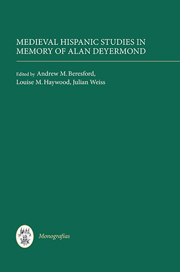Book contents
- Frontmatter
- Contents
- Contributors
- Foreword: Alan Deyermond: A Memoir
- Acknowledgments
- Abbreviations
- Introduction: Alan Deyermond, 1932–2009
- 1 Sanctity and Prejudice in Medieval Castilian Hagiography: The Legend of St Moses the Ethiopian
- 2 The Image of the Phoenix in Catalan and Castilian Poetry from Ausiàs March to Crespi de Valldaura
- 3 On the Frontiers of Juan Rodríguez del Padrón's Siervo libre de amor
- 4 Memory as Mester in the Libro de Alexandre and Libro de Apolonio
- 5 Advancing on ‘Álora’
- 6 Time is of the Essence: Essence, Existence, and Reminiscence in Two Portuguese Poets
- 7 Gómez Manrique's Exclamación e querella de la governación: Poem and Commentary
- 8 The Misa de amor in the Spanish Cancioneros and the Sentimental Romance
- 9 ‘Manus mee distillaverunt mirram’: The Essence of the Virgin and an Interpretation of Myrrh in the Vita Christi of Isabel de Villena
- 10 ‘Nos soli sumus christiani’: Conversos in the Texts of the Toledo Rebellion of 1449
- 11 Vernacular Commentaries and Glosses in Late Medieval Castile, II: A Checklist of Classical Texts in Translation
- 12 Games of Love and War in the Castilian Frontier Ballads: El romance del juego de ajedrez and El romance de la conquista de Antequera
- 13 ‘Esta tan triste partida’ (Conde Dirlos, v. 28a): maridos y padres ausentes
- Index
- Tabula in memoriam
1 - Sanctity and Prejudice in Medieval Castilian Hagiography: The Legend of St Moses the Ethiopian
Published online by Cambridge University Press: 05 May 2013
- Frontmatter
- Contents
- Contributors
- Foreword: Alan Deyermond: A Memoir
- Acknowledgments
- Abbreviations
- Introduction: Alan Deyermond, 1932–2009
- 1 Sanctity and Prejudice in Medieval Castilian Hagiography: The Legend of St Moses the Ethiopian
- 2 The Image of the Phoenix in Catalan and Castilian Poetry from Ausiàs March to Crespi de Valldaura
- 3 On the Frontiers of Juan Rodríguez del Padrón's Siervo libre de amor
- 4 Memory as Mester in the Libro de Alexandre and Libro de Apolonio
- 5 Advancing on ‘Álora’
- 6 Time is of the Essence: Essence, Existence, and Reminiscence in Two Portuguese Poets
- 7 Gómez Manrique's Exclamación e querella de la governación: Poem and Commentary
- 8 The Misa de amor in the Spanish Cancioneros and the Sentimental Romance
- 9 ‘Manus mee distillaverunt mirram’: The Essence of the Virgin and an Interpretation of Myrrh in the Vita Christi of Isabel de Villena
- 10 ‘Nos soli sumus christiani’: Conversos in the Texts of the Toledo Rebellion of 1449
- 11 Vernacular Commentaries and Glosses in Late Medieval Castile, II: A Checklist of Classical Texts in Translation
- 12 Games of Love and War in the Castilian Frontier Ballads: El romance del juego de ajedrez and El romance de la conquista de Antequera
- 13 ‘Esta tan triste partida’ (Conde Dirlos, v. 28a): maridos y padres ausentes
- Index
- Tabula in memoriam
Summary
Introduction
The legend of the black saint, Moses the Ethiopian (c. 330–405), offers a unique insight into the complexity not just of fourth-century asceticism, but of the evolution of popular attitudes towards questions of ethnic origin and somatic type in Christian tradition as a whole. Characterized by an overarching impression of duality, Moses stands partly as one of the many who followed in the footsteps of St Antony of Egypt, forsaking the corruption of society to lead a life of ascetic isolation in the desert, but partly also as an exception, remarkable not for his achievements in piety, but for the colour of his skin. This is marked in various accounts – ancient and medieval alike – as a signifier of alterity, and ultimately, cognate notions of iniquity and racial inferiority.
As a hybrid amalgam of Christian ascetic and marginalized other, Moses's legacy is one that can be appraised from a variety of perspectives and subjected to a number of critical approaches. A productive and informative tool is postcolonial theory, which although often regarded as suitable for application to a series of specific spatio-temporal locations linked in dialogue with modernity, is applicable more generally to relations of hegemony and resistance in the encounter between different cultures and peoples, and particularly, to interstices produced by hierarchically uneven cultural contacts wherever they are found.
- Type
- Chapter
- Information
- Medieval Hispanic Studies in Memory of Alan Deyermond , pp. 11 - 38Publisher: Boydell & BrewerPrint publication year: 2013



